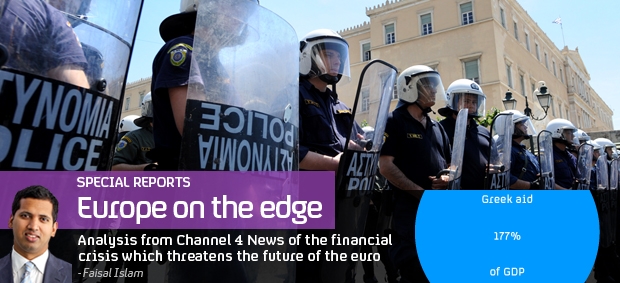Syriza versus the Bundesbank for the soul of the eurozone
There is a vital semantic difference between “planning to” and “making contingencies for” an event. This today’s reports of widespread plans for Greek euro exit were not quite as shocking as they sounded. Right now, no one is talking about a “plan” to force Greece out. Quite understandably, however, there are widespread contingencies being prepared for a possible decision by Greece to leave the euro.
Private banks and car companies have been doing this for months, as I reported from Davos in January. I understand that governments have been looking carefully at the example of what happened when Czechoslovakia split. Czechs and Slovaks had to queue up to get their banknotes stamped. Capital controls were introduced. Some degree of state security had to keep order.
Does this mean Greece is heading out? No, but it is a sign that the chances are rising. It is, at the very least, part of the brinkmanship between the Greek leftists that want to tear up the EU bailout deal, and the EU governments that are funding it.
 The most remarkable new news today came from the Bundesbank, Germany’s central bank. I did a film from there last Autumn, and all you really need to know about the Bundesbank tendency is that it has a museum to monetary stability, featuring a one trillion mark note, from Germany’s hyperinflation. Today, with consummate timing as leaders arrived for today’s informal EU summit, it released a thunderbolt from Frankfurt.
The most remarkable new news today came from the Bundesbank, Germany’s central bank. I did a film from there last Autumn, and all you really need to know about the Bundesbank tendency is that it has a museum to monetary stability, featuring a one trillion mark note, from Germany’s hyperinflation. Today, with consummate timing as leaders arrived for today’s informal EU summit, it released a thunderbolt from Frankfurt.
Its monthly report included a section on “current developments in Greece”, described as “extremely worrying”.
“Greece is threatening not to implement the reform and consolidation measures that wee agreed in return for the large-scale aid programmes. This jeopardises the continued provision of assistance. Greece would have to bear the consequences of such a scenario,” it says.
That seems pretty close to the second form of Drachmail that I identified last week. And as to the suggestion by the Greek left that so damaging would be the contagion from a Greek euro exit, that Germany and others would back down:
“The challenge this would create for the euro area and Germany would be considerable but manageable given prudent crisis management”.
Now it is important to say that Merkel has overruled the instincts of the fiercely independent Buba (Bundesbank), several times. And as the Bundesbank never wanted Greece in the eurozone in the first place, it is hardly surprising that it confirms contingencies that would make Greek exit “manageable”.
But this seems a game of the Greek left versus the Bundesbank, for the soul of the eurozone.
Follow Faisal Islam on Twitter:http://twitter.com/faisalislam
